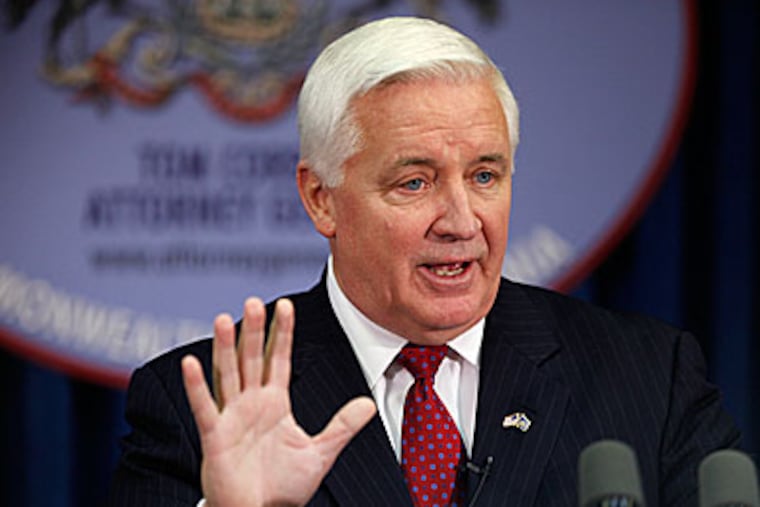Inquirer Editorial: Healthy move by Corbett
News that Gov. Corbett is embracing a key component of national health-care reform may sound like a turning point that only a bureaucrat could love. But more than a million Pennsylvanians may one day be grateful that the governor is taking this important step now.

News that Gov. Corbett is embracing a key component of national health-care reform may sound like a turning point that only a bureaucrat could love. But more than a million Pennsylvanians may one day be grateful that the governor is taking this important step now.
With the Corbett administration's announcement last week that the state would move ahead to establish a state-run clearinghouse for individual and small-business health-insurance policies, the governor has charted a sensible, pragmatic course that ultimately should improve the well-being of residents statewide.
For the first time, the so-called insurance exchanges - available online and by phone - will make it easy for people to shop for quality, affordable health-insurance coverage. As easily as Cyber Monday shoppers compared retail offers, anyone in the market for health insurance as of 2014 will be able to see how insurers' policies stack up against the competition on price and coverage.
What's more, the exchanges will be the entry point for low-income residents to apply for government help in buying insurance under the federal health-care overhaul. That will put affordable coverage within reach of more of the state's estimated one million uninsured residents.
While it's clearly in the state's best interest to develop an insurance exchange tailored to its own needs, Corbett has another option: He could enroll Pennsylvania in the federal insurance exchange, which will serve as a fallback for states that don't set up their own insurance marketplace.
Going that route wouldn't have surprised many observers, since Corbett - as state attorney general - joined 25 other states that are suing to overturn President Obama's landmark reform. But doing that could have prevented Pennsylvanians from benefiting fully in the event that the Patient Protection and Affordable Care Act survives its challenge now before the U.S. Supreme Court.
In some Republican-led states, governors have made it a badge of political and ideological honor to do as little as possible about implementing the federal health-care reform. Corbett's wise decision indicates he's willing to steer clear of such tactics when the public interest is at stake.
Unfortunately, Corbett's line of thinking still doesn't extend to doing an even better thing, which would be to withdraw the state from the coalition trying to scuttle the nation's best hope for addressing the problem of millions of Americans without health insurance. Presumably, that would save state taxpayers on legal costs if nothing else.
But for now, Harrisburg lawmakers need to put aside their partisan concerns and work out the complex details of the insurance exchange. On that, Corbett has pointed the right way.